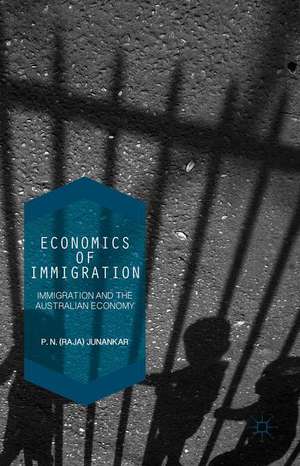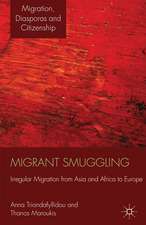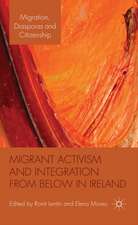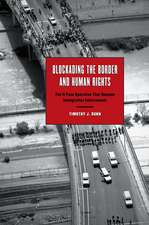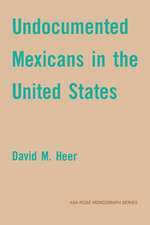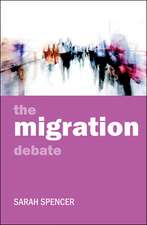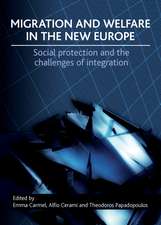Economics of Immigration: The Impact of Immigration on the Australian Economy
Editat de P. N. (Raja) Junankaren Limba Engleză Hardback – 14 mar 2016
Junankar argues immigration has been beneficial for employment and growth; not only adding to labour supply but also to labour demand, hence leading to favourable outcomes. This collection of essays shows how immigration has helped the economic development of Australia, while also highlighting that the historical reasons for immigration lie in the colonisation of many countries in Asia and Africa.
Preț: 645.79 lei
Preț vechi: 759.76 lei
-15% Nou
Puncte Express: 969
Preț estimativ în valută:
123.59€ • 128.05$ • 103.14£
123.59€ • 128.05$ • 103.14£
Carte tipărită la comandă
Livrare economică 21 martie-04 aprilie
Preluare comenzi: 021 569.72.76
Specificații
ISBN-13: 9781137555243
ISBN-10: 1137555246
Pagini: 344
Ilustrații: XVII, 344 p.
Dimensiuni: 140 x 216 x 21 mm
Greutate: 0.57 kg
Ediția:1st ed. 2016
Editura: Palgrave Macmillan UK
Colecția Palgrave Macmillan
Locul publicării:London, United Kingdom
ISBN-10: 1137555246
Pagini: 344
Ilustrații: XVII, 344 p.
Dimensiuni: 140 x 216 x 21 mm
Greutate: 0.57 kg
Ediția:1st ed. 2016
Editura: Palgrave Macmillan UK
Colecția Palgrave Macmillan
Locul publicării:London, United Kingdom
Cuprins
List of Figures
List of Tables
Foreword, by Geoff Harcourt
Preface
1. Introduction
2. Impact of Immigration on Recipient Economy
2.1 Immigration and the Australian Macroeconomy: Perspective and Prospective
2.2 Immigration, Wages and Price Stability
2.3 Immigration and Australia's External Account Balances
2.4 Recent Immigrants and Housing
3. How do Migrants Fare in the Labour Market
3.1 Do Migrants Get Good Jobs? New Migrant Settlement in Australia
3.2 Do Migrants Get Good Jobs in Australia? The Role of Ethnic Networks in Job Search
3.3 Are Asian Migrants Discriminated Against in the Labour Market: A Case Study of Australia
Index
List of Tables
Foreword, by Geoff Harcourt
Preface
1. Introduction
2. Impact of Immigration on Recipient Economy
2.1 Immigration and the Australian Macroeconomy: Perspective and Prospective
2.2 Immigration, Wages and Price Stability
2.3 Immigration and Australia's External Account Balances
2.4 Recent Immigrants and Housing
3. How do Migrants Fare in the Labour Market
3.1 Do Migrants Get Good Jobs? New Migrant Settlement in Australia
3.2 Do Migrants Get Good Jobs in Australia? The Role of Ethnic Networks in Job Search
3.3 Are Asian Migrants Discriminated Against in the Labour Market: A Case Study of Australia
Index
Recenzii
“This book is a commendable summary of Junankar’s valuable contribution to the academic literature on immigration in Australia. … Immigration is a uniquely integral part of Australia’s economic history. As such, studying its effects is markedly pertinent. The articles in this book constitute a significant contribution to that end by looking at various aspects of immigration. Though research continues on immigration in Australia and throughout the world, this compilation provides an important portion of the academic literature on the subject.” (Kacey Douglas, Journal of Economic and Social Thought, Vol. 3 (2), June, 2016)
Notă biografică
Raja Junankar studied at the London School of Economics, and has a Ph.D. from the University of Essex. He has held research and teaching appointments in Australia, Britain, Canada, France, Germany, India, and the United States of America. He has published several books and refereed papers in leading national and international journals. He is an Emeritus Professor, University of Western Sydney and Honorary Professor, UNSW Australia.
Textul de pe ultima copertă
Poverty, famines, wars, and ethnic conflicts lead to large movements of refugees. The papers in this book provide an analysis of the economics of immigration. Junankar discusses why people migrate, the likely destinations for migrants, and their employment in the destination countries. He studies the benefits to the migrant families in terms of higher wages and living standards, and also studies how immigrants fare in the Australian labour markets in terms of finding good jobs, and whether there is discrimination against them. Economics of Immigration analyses the macroeconomic impacts of immigration on the Australian economy and discusses why some groups favour immigration while other groups are against it.
Junankar argues immigration has been beneficial for employment and growth; not only adding to labour supply but also to labour demand, hence leading to favourable outcomes. This collection of essays shows how immigration has helped the economic development of Australia, while also highlighting that the historical reasons for immigration lie in the colonisation of many countries in Asia and Africa.
Junankar argues immigration has been beneficial for employment and growth; not only adding to labour supply but also to labour demand, hence leading to favourable outcomes. This collection of essays shows how immigration has helped the economic development of Australia, while also highlighting that the historical reasons for immigration lie in the colonisation of many countries in Asia and Africa.
